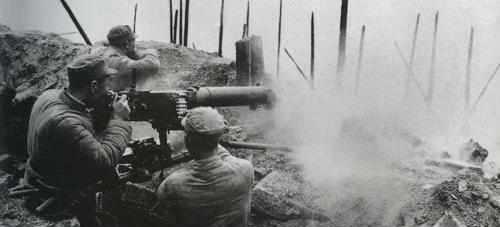In the 14-year War of Resistance Against Japanese Aggression, the Chinese army and the Japanese army fought bloodily for 14 years, and there were many famous battles. The battle of Songhu was fought by poor And weak China, and the cowhide of Japan's 3-month death was blown through, and the Battle of Pingxingguan shattered the myth of the japanese army's invincibility. Although the Chinese army was constantly defeated by the Japanese army and major large and medium-sized cities in the country were captured, it only strengthened the determination of the Chinese to resist the war.

After 11 years of resisting the Japanese army alone, the climax of the world's World War II counteroffensive finally arrived. In October 1943, the Soviet Union launched a counterattack against the Germans across the board, and the Japanese army was gradually defeated on the Pacific islands. In order to save the fate of defeat, the Japanese army desperately launched the Battle of Changde, gathering 5 divisions and 100,000 people, thus creating the famous Changde Battle Tiger Ben Division.
Stationed in Changde were more than 8,000 people from the 57th Division of the elite 74th Army of the Nationalist Army, and the division commander Yu Chengwan. In less than a few days, 100,000 Japanese troops took over the positions around Changde, and Changde was besieged. For this reason, Commander Yu Chengwan deliberately posted that Changde is not a place conducive to sticking to it, but the duty of a soldier is to defend the family and defend the country, and must not run away because of the unfavorable terrain of Changde, in order to defend Changde and defend the country, death is more valuable than living. Not only that, before the Japanese army defended Changde, he had evacuated all the people in the city, leaving only the officers and men of the 57th Division in the city, and dug up all the retreat routes to show his determination.
The Battle of Changde was extremely fierce, and the 8,000 Nationalist troops, under the siege of 100,000 Japanese troops, had to fight for every inch of land and fought with the Japanese army in the streets. At the end of the battle, the lone army resisted for more than 40 days, leaving only more than 300 people in the whole division, almost running out of ammunition and food, and the reinforcements were delayed. Under the persuasion of his subordinates, Yu Chengwan led more than 80 people to highlight the city to ask for help, and after 40 days of stubborn resistance, the Japanese army lost confidence and retreated. The bloody battle of Changde was finally won at the cost of the sacrifice of eight thousand tiger divisions, and Yu Chengwan was also sent to a military court by Chiang Kai-shek for abandoning the city for help, and only because Yu's superiors came forward to intercede, he was saved from death.